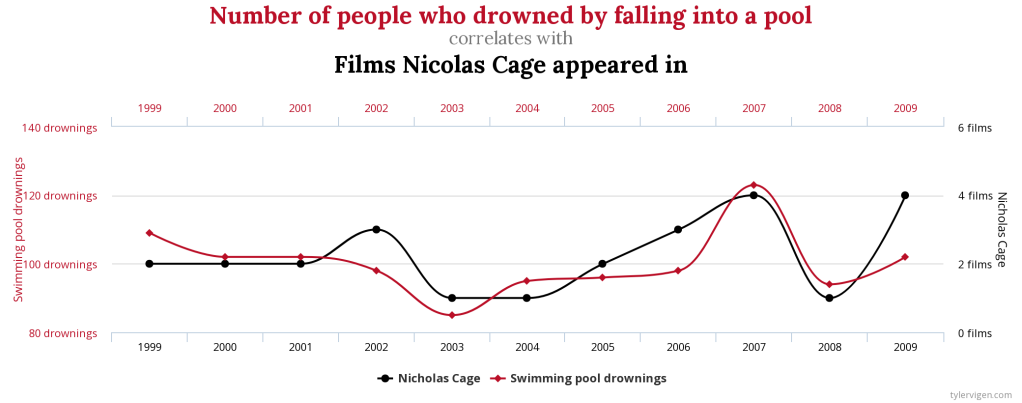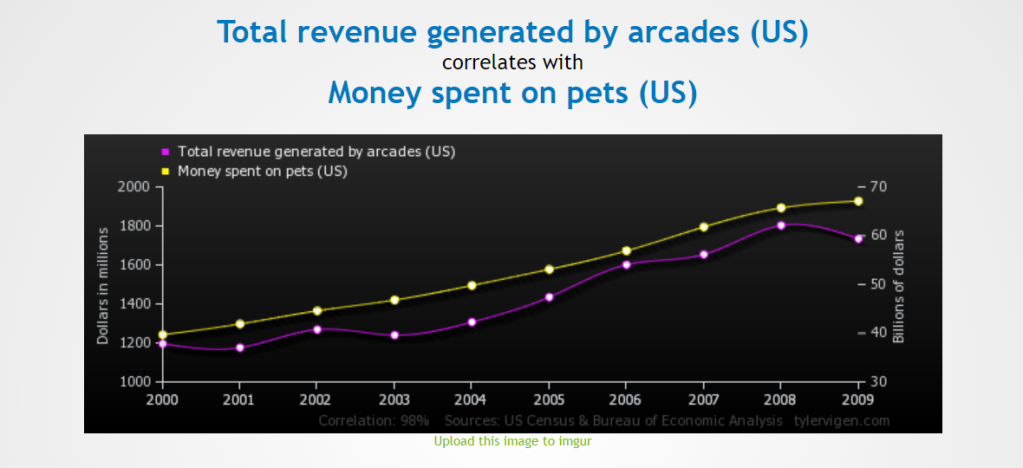According to Wikipedia, a spurious correlation is a mathematical relationship in which two or more events or variables are associated but not causally related, due to either coincidence or the presence of a certain third, unseen factor (referred to as a “common response variable”, “confounding factor”, or “lurking variable”).
Tyler Vigen, a graduate of Harvard Law School and currently a consultant at Boston Consulting Group, has made sport of spurious correlations on his website, which charts farcical relationships between two variables.
Here are a few of the more far-flung relationships that Tyler has correlated:
Chart 1

Chart 2

Chart 3

And perhaps one of the best features of the web site is that you can create your own ridiculous correlations; here is one I created:

Vigen notes that the charts on his site aren’t meant to imply causation nor are they meant to create a distrust for research or even correlative data. Rather, he hope the project fosters interest in statistics and numerical research.
And what a noble cause that is…

I never realized bedsheets were so dangerous. There is the saying about lies, damn lies and statistics.
LikeLiked by 2 people
Makes me recall the time I heard my alarm, jumped out of bed, headed for the alarm clock (across the room), found my feet both tangled in the sheets, and faceplanted as my fingers grazed the clock but miss the alarm. Thank gawd I was young and could afford a fall like that. I wish I had video!
LikeLiked by 1 person
glad you didn’t become one of the statistics!
LikeLiked by 1 person
I never realized it either. But I do remember writing a blog post a few years ago about the number of people who die each year because of a vending machine falling on them…
LikeLiked by 1 person
Jim. This is quite interesting and I know you to be a numbers guy. That said: there is nothing, ZERO, nada that proves these relationships are NOT causal! Back to the drawing board my friend. Chase
LikeLiked by 4 people
that’s true, but the question is which direction if the causality… 🙂
LikeLike
Pastafarianism’s core beliefs includes the correlation between the decrease in pirates and increase in global warming. Have you been touched by his noodly appendage?
LikeLiked by 1 person
I had never heard of this, so I spent time reading about it on Wikipedia – love the parody… thanks for sharing…
LikeLike
Ramen!
LikeLiked by 1 person
Interesting post. So should I be afraid to sleep with sheets now? I think I am more afraid of spiders, venomous or not!
I like the cheese one! 😉
And lots of money is spent on pets But they are worth it!
LikeLiked by 2 people
I’d take my chances with the bedsheets as well. And yes, certain pets are worth it 🙂
LikeLike
😊🐕🦮🐈🐈⬛🦄
LikeLiked by 1 person
A concept to think about before we too eagerly repeat a delicious statistic.
LikeLiked by 2 people
well said…
LikeLike
I would have responded earlier, but my bedsheets were trying to strangle me. I remember reading a book a long time ago in college called How to Lie With Statistics.
LikeLiked by 2 people
glad you were able to escape those killer bedsheets – who knew?!
That is a classic book…
LikeLiked by 1 person
Having watched Nicholas Cage’s acting/films, I would suspect ‘suicide’ not ‘falling’ in a pool.
LikeLiked by 2 people
maybe they didn’t want to make the causality so potentially obvious.
although I do have to admit that one of my all-time favorite movies is Family Man – we watch it every New Year’s Eve. But that may be more a function of Tea Leoni than Nicholas Cage… 🙂
LikeLike
I’ve never seen The Family Man but now you mention Tea Leoni, I might give it a go.
LikeLiked by 1 person
it’s worth a shot… 🙂
LikeLike
I can see where this entertaining venture can take the edge off of checking your stats too frequently. Great post and share, Jim!
LikeLiked by 1 person
exactly – who said statistics can’t be fun… 🙂
LikeLiked by 1 person
I was always told that I shouldn’t eat cheese just before bedtime. Mr Vigen has just proved why. Have you tried mapping your stats against something? Ice cream consumption, perhaps?
LikeLiked by 1 person
glad Mr. Vigen has offered you such insight.
I think the most obvious correlation with my blog stats would be number of people who claim they waste too much time on the Internet and the number of people who read my blog…
LikeLiked by 1 person
I’m sure you can find the stats somewhere…
LikeLiked by 1 person
I don’t think I want to… 🙂
LikeLiked by 1 person
😂
LikeLiked by 1 person
these are hilarious! making stats fun!!
LikeLiked by 1 person
yes! who knew that was possible!
LikeLiked by 1 person
I don’t know. That spelling bee-spider bite correlation makes a lot of sense.
LikeLiked by 1 person
especially the one year when arachnophobia was the winning word…
LikeLiked by 1 person
Well, anyone who’s studied the scientific method knows that there’s a difference between correlation and causation. For instance, the rate of stupidity tends to increase with the rate of correlational studies reported by the media. But correlational studies do not cause stupidity. Rather, stupidity causes correlational studies.
LikeLiked by 1 person
it’s a vicious cycle…
LikeLiked by 1 person
First of all, I had to look up spurious and that was very interesting in itself. A bastard is one of the meanings. I kind of like that because it gives me an actual word to use to describe purveyors of fake correlations and fake news.
LikeLiked by 1 person
When I went to get the definition from Wikipedia, I saw that mention of the word bastard; I had never heard of that as another meaning of the word.
But I love your use of it 🙂
LikeLiked by 1 person
This does make correlations seem rather ridiculous thought, doesn’t it?
LikeLiked by 1 person
indeed they do 🙂
LikeLike
Hmm, the mecca of timely research. I wonder what happens when I google any of these. Hopefully, I will still be sitting here in one piece.
LikeLiked by 1 person
yes. who knew there were so many strange ways to die!
LikeLike
I love it. I find the cheese and bed sheets very interesting and perhaps there is a causality there after all? Too much cheese can make you sluggish and bloated, which can result in clumsy bed-exiting, hence getting entangled in sheets. Just a thought.
LikeLiked by 1 person
these were pretty humorous, and it would be fun to try come up with possible explanations as to why these variables really are correlated, much like you did!
LikeLiked by 1 person
Interesting share!
I’ve checked out the website and laugh at correlation between US spending on science, space and technology against suicides by hanging, suffocate and strangling!
I guess I thought “what if there really was a link!”
LikeLiked by 1 person
it’s a good reminder to test some claimed correlations; you could always find something that correlates with something you are interested. the big question is does the relationship make any sense…
LikeLike